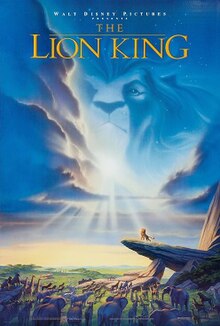 |
| courtesy of Wikipedia |
The second
movie that I chose to look at for my research project on Disney and society was
The Lion King, a 1994 Walt Disney Pictures film directed by Rodger Allen and
Rob Minkoff It was another of Disney’s movies that portrayed animals with human
personalities. Based loosely off of Hamlet the film follows Simba, a Lion cub
who is convinced that he is responsible for his father’s death and runs away from
home attempting to escape his past. As his pride falls victim to drought he
must go back and save his family from termination. The Lion King was one of
the most well revered Disney movies of the 1990’s. According to IMDB the film
has grossed $945,578,747 since its 1994 release. The movie was re-released
in 2011 which contributed to the total gross earnings of the film.
 What began
as an innocent children’s movie quickly came under fire from critics for
portraying other races and cultures in a negative light. One of the main
complaints, depicted in the documentary Mickey Mouse Monopoly were the
accents portrayed by the Hyena’s whose voiceovers were done by Whoopi Goldberg
and Cheech Marin. In the documentary, a concerned mother tells a story of her
son pointing at some African American children who are playing and says “Look
mom, the Hyena’s”, as the woman turns her back to the children playing she
recognised that the laugh of the Hyena’s in the Disney movie sounded much like
the voices of these small children playing. This situation determined for the
woman that Disney may have been deliberately trying to insult urban children in
the movie The Lion King.
What began
as an innocent children’s movie quickly came under fire from critics for
portraying other races and cultures in a negative light. One of the main
complaints, depicted in the documentary Mickey Mouse Monopoly were the
accents portrayed by the Hyena’s whose voiceovers were done by Whoopi Goldberg
and Cheech Marin. In the documentary, a concerned mother tells a story of her
son pointing at some African American children who are playing and says “Look
mom, the Hyena’s”, as the woman turns her back to the children playing she
recognised that the laugh of the Hyena’s in the Disney movie sounded much like
the voices of these small children playing. This situation determined for the
woman that Disney may have been deliberately trying to insult urban children in
the movie The Lion King.
As I watched
the movie I took a critical perspective and tried to connect to whether there
were racial stereotypes of Latino and African American people. As I tried to
find the racial stereotypes that Mickey Mouse Monopoly claims are depicted I
had a challenging time proving that beyond a shadow of a doubt that there was
racism. First of all, I counted well over five different accents depicted in
the movie including the New Yorker accent of Shenzi the Hyena (Whoopi Goldberg)
and the New Jersey accents of Timon and
Pumbaa (Nathan Lane and Ernie Sabella respectively). There were two different
dialects of British accents, mostly American accents and a singular Swahili
accent.
 |
| Whoopi Goldberg and Cheech Marin as Hyena's Photos Courtesy of IMDB |
Criticism
for the voices in the movie came from numerous sources such as Robert
Gooding-Williams article Disney in Africa and the inner city: On Race and space in The Lion King where he states “First,
[The Lion King] uses Whoopi Goldberg's and Cheech Marin's voices to represent
the speech of two of the three prominent hyena characters as black English and
Latino slang respectively”. It should
be noted that neither Whoopi Goldberg nor Cheech Marin appeared to disguise
their voices to make their accent sound more “Black English” nor “Latino slang”
as Gooding-Williams claims. As Terry
Press, a spokesman for Disney told the Globe and Mail on July 26, 1994 "Do
you think Whoopi Goldberg would lend her voice to a character that is racist? I
don't think so.", Considering Whoopi Goldberg is known to advocate
for human rights, and has spent much of her career working with children I
agree that the likelihood that she would voice a racially offensive character
in a children’s movie is slim
 |
| James Earl Jones as Mufasa. via IMDB |
Racism has
been prevalent in Disney previously as referenced in earlier films such as
Dumbo (1941), who’s “Jiving” black crows were a clear racial stereotype portrayal of
African American’s in the 1940’s. While this type of racism was common in films
of the past it appears that scholars today may be using preconceived notions of
Disney when reviewing movies such as “The Lion King” in present day. If a person
is to state that the portrayal of Hyena’s in the movie are racist than they
need to also consider the strong African American people who voiced other
characters in the movie such as James Earl Jones as Mustafa and Madge Sinclair
as Simba’s mother Sarabi.
Having
always enjoyed The Lion King, I have to admit to feeling a sense of relief
after being worried that I would taint another favourite Disney movie of mine.
While I feel that Disney has definitely done some injustice to different racial
groups I don’t see a clear depiction of this when it comes to the Hyena’s in
this movie. If I wasn’t able to clearly define racial prejudice in the movie I
fail to see how this could be considered as a poor influence on children as the
argument for Disney movies often goes. I believe that the film if anything
portrays more violent images, such as the death of Mustafa than it does racist
imagery. In this case it seems like it was Disney’s history of being perceived as
racist had more affect on parents and scholars than the movie actually did.
No comments:
Post a Comment